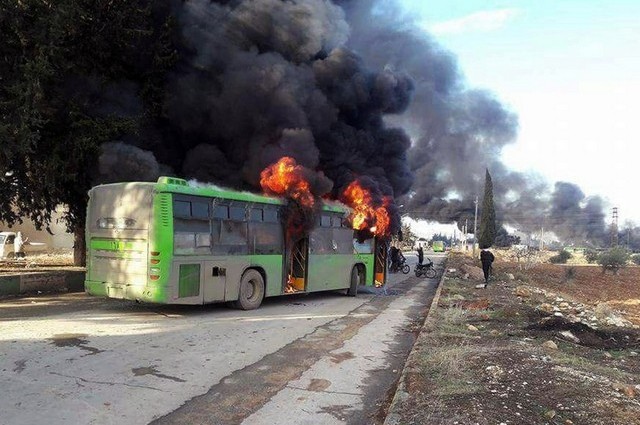Evacuations from Aleppo ‘postponed until further notice’

'BEIRUT // The latest attempt to evacuate fighters and tens of thousands of civilians from opposition neighbourhoods of Aleppo faltered on Sunday as buses sent to ferry the sick and injured from two rebel-besieged Shiite villages as part of the agreement came under attack.
The Syrian Observatory for Human Rights said on Sunday night that the evacuations had been postponed until further notice, but there was no comment from either the rebels or pro-government forces.
No evacuees left east Aleppo or the villages on Sunday, the Britain-based opposition monitoring group said.
A new deal to evacuate the last rebel-held areas of eastern Aleppo was reached on Saturday, a day after a previous agreement collapsed amid violence. Evacuations from the government-held villages of Foua and Kefraya in Idlib province were to take place simultaneously.
But a convoy of buses heading to the villages on Sunday was attacked in rebel territory. Pictures of the aftermath showed at least four of the buses on fire. A video posted on social media showed fighters cheering as the vehicles burnt while celebratory gunfire rang out.
"The buses that were brought to transport the rafidas [a derogatory term for Shiites] have been burnt. We will burn anyone who comes to transport them out of here," a voice can be heard saying. "By the will of God, they shall leave here as corpses," it said, referring to the residents of the villages.
The Observatory said Jabhat Fatah Al Sham had carried out the attack. The group, Al Qaeda’s former Syria branch, had reportedly opposed the evacuations from Foua and Kefraya, which were included in the Aleppo deal last week at the insistence of Iran-backed pro-government forces.
Rebel factions in Aleppo condemned the attack on the convoy as a "crime against the revolution".
The fate of the bus drivers was unclear, although the head of the UN’s humanitarian task force for syria, Jan Egeland, referred in a tweet to a driver being killed.
Following the attack, fighting broke out in the area between Jabhat Fatah Al Sham and its former ally Ahrar Al Sham, a powerful hardline Islamist militia, Al Manar television station reported.
The TV station is linked to Hizbollah, which is fighting on the side of Syrian president Bashar Al Assad.
Despite the attack in Idlib, Syrian state media reported that a number of buses had left rebel-held areas of Aleppo, suggesting the evacuation deal could still go through. However, this claim was not confirmed by other parties and observers of the conflict.
The complicated agreement involved 48 hours of "intense negotiations", according to Osama Abo Zeid, a rebel legal officer and part of the negotiation team. "The general atmosphere is better" with this deal but there were still chances for it to be derailed, he said in a statement issued on Sunday morning.
"We still have no guarantees as the United Nations, International Committee of the Red Cross [and] Syrian Arab Red Crescent are not able to play their full role in protecting convoys from eastern Aleppo."
Ahead of the attack on the convoy, a rebel official told Agence France-Presse that the evacuation deal would be carried out in stages, with half of the people left in Aleppo to be evacuated first along with 1,250 people from Foua. In the second stage, 1,250 people from Kefraya would be evacuated at the same time as the remaining residents and fighters in eastern Aleppo.
\
Later, he added, another 1,500 people would leave Kefraya and Foua as two besieged rebel towns near the Lebanese border were evacuated.
At around noon on Sunday, Syrian state media and Al Manar reported that buses had started to enter Aleppo’s rebel-held areas to complete the evacuation. Soon, pro-government outlets said that buses had arrived in Foua, although it was not clear if these had escaped the rebel attack attack or were from a separate convoy.
The UN Security Council was set to vote on Sunday on a French resolution that calls for international observers to monitor the evacuation of eastern Aleppo as well as the delivery of much needed humanitarian aid.
However, Mr Al Assad’s chief ally, Russia, which has consistently blocked council resolutions regarding Syria, said it would veto the proposal and put forward its own.
Russia’s UN ambassador Vitaly Churkin said before the security council meeting that Moscow had no problem with monitoring. However, the idea that monitors "should be told to go to wander around the ruins of eastern Aleppo without proper preparation and without informing everybody about what is going to happen – it has disaster written all over it", he said.
He said Russia would put "some very simple ideas" – which he refused to disclose – to council members and that if they agreed a resolution could be adopted.
After evacuations were halted on Friday, Russia said it considered the operation to be completed and that no women or children remained in rebel areas of the city. The UN believes up to 40,000 civilians rem
Политика конфиденциальности | Правила пользования сайтом








